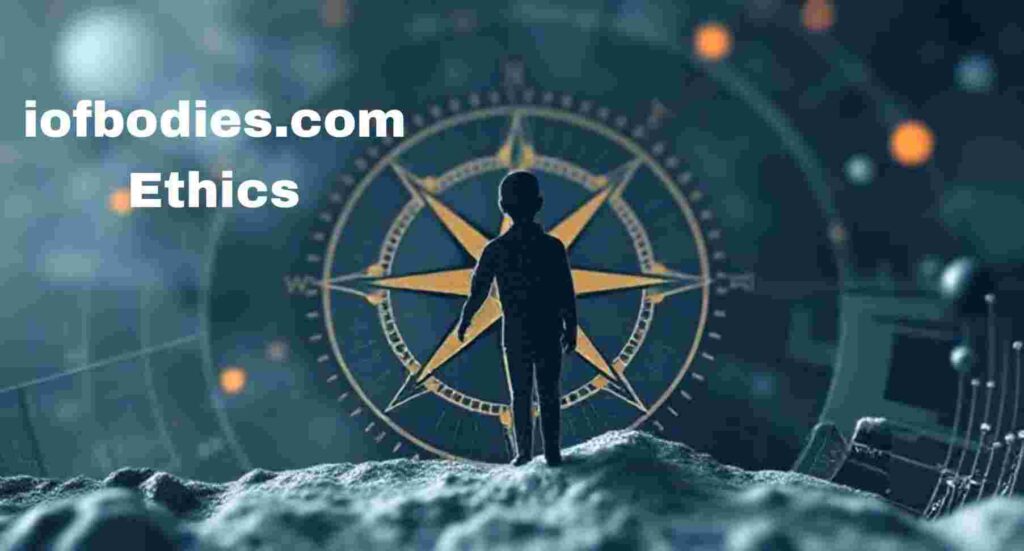In the ever-expanding digital ecosystem, ethical boundaries are constantly tested, especially in spaces where technology meets deeply personal human experiences. One such intriguing area is iofbodies.com, a platform that has stirred considerable interest due to its unique and often controversial approach to digital identity, bodily autonomy, and virtual representation. At the core of this discussion lies the concept of iofbodies.com ethics—a complex interplay of morality, legality, and human values in the virtual domain.
This article explores the ethical framework of iofbodies.com, the debates surrounding it, and the broader implications it may have on digital ethics in the future. We’ll break down the subject into digestible, informative sections for a clearer understanding of why ethics matter in this space and how users and observers should think critically about such platforms.
What is iofbodies.com?
Before diving into the ethical dimensions, it’s important to first understand what iofbodies.com actually is. At its essence, the platform seems to be a digital repository or interface dealing with representations of human bodies—possibly in a medical, artistic, or identity-centric context. While the exact nature of the site may differ depending on interpretation or content evolution, one thing remains consistent: it navigates territory closely linked with human dignity, privacy, and authenticity.
Whether it’s avatars, digital scans, or data-driven simulations, iofbodies.com operates at the intersection of personal identity and digital presence. This positioning naturally brings up numerous ethical questions.
The Core Principles of iofbodies.com Ethics
1. Consent and Autonomy
Perhaps the most crucial principle in the ethical discussion of iofbodies.com is informed consent. If the platform is using or displaying representations of individuals, it must do so only with the full and informed consent of those involved. Digital simulations or renderings that replicate real bodies without permission are a serious violation of ethical norms.
Autonomy means respecting users’ choices and ensuring they have control over their digital likeness. For iofbodies.com to operate ethically, it must prioritize autonomy as a foundational value.
2. Transparency and Accountability
In any digital system, transparency about data collection, usage, and presentation is vital. Users should understand what information is being gathered, how it is stored, and what it is used for. This is particularly relevant when dealing with sensitive bodily data.
Moreover, iofbodies.com ethics must include accountability mechanisms. Who is responsible if a user’s digital likeness is misused? Is there a system to handle complaints or ethical violations? These questions are central to the platform’s credibility.
3. Non-Exploitation and Respect for Human Dignity
Exploiting human likenesses, bodies, or identities for profit without consent or respect is a direct violation of ethical norms. iofbodies.com should ensure that all content upholds human dignity and that no individual or group is degraded, objectified, or commodified.
Respect should be inherent in the platform’s user experience, policies, and partnerships.
Ethical Controversies Surrounding iofbodies.com
1. The Blurred Line Between Art and Exploitation
If iofbodies.com presents content that is artistic in nature—perhaps digital art that uses human forms—there is a fine line between expression and exploitation. Ethical concerns arise when such art is created without consent, particularly if it mimics or copies real individuals.
Art should provoke thought, not ethical outrage. Navigating this delicate balance is critical.
2. Data Privacy Concerns
As with any digital platform that deals with human features or personal data, privacy becomes a major ethical battleground. How secure is user data on iofbodies.com? Can it be sold or shared without permission?
If the platform doesn’t adhere to strict data privacy regulations like GDPR or CCPA, it risks both legal consequences and the erosion of user trust.
3. AI-Generated Bodies and Ethical Confusion
In the age of artificial intelligence, some platforms are generating synthetic bodies or avatars. If iofbodies.com uses AI in this way, there must be clear labeling to distinguish between real and fictional creations. Ethical confusion occurs when viewers or users cannot tell the difference, potentially leading to manipulation or misinformation.
The Legal vs. Ethical Divide
One of the biggest misconceptions is that if something is legal, it is automatically ethical. However, legality does not always align with morality.
Iofbodies.com ethics must operate beyond mere compliance with laws. The platform must create its own code of ethics, shaped by philosophical reasoning, cultural sensitivity, and moral responsibility. This is particularly vital in grey areas where laws may not yet exist.
Why iofbodies.com Ethics Matter
1. Protecting Vulnerable Populations
Minors, marginalized communities, and individuals with limited digital literacy are at higher risk of exploitation. Ethical platforms like iofbodies.com must implement extra layers of protection to ensure these groups are not harmed.
2. Setting a Precedent in Digital Spaces
Platforms like iofbodies.com are part of a broader digital transformation. The way they handle ethical issues sets a precedent for future platforms. Whether they choose responsibility or recklessness will impact the digital landscape for years to come.
3. User Trust and Reputation
In an era of information overload and rising cybercrime, trust is currency. Ethical behavior builds user trust, boosts brand reputation, and encourages long-term success. Ignoring ethical responsibilities may bring short-term gain but leads to lasting damage.
Recommendations for Ethical Excellence on iofbodies.com
To reinforce a strong moral framework, here are actionable steps iofbodies.com can take:
- Develop a clear ethics policy published openly on the website.
- Obtain explicit, informed consent for all representations and data.
- Implement transparency tools, such as activity logs and data trackers.
- Establish an ethical review board to oversee new content or features.
- Foster a culture of respect for both digital and real-world identities.
- Offer users the right to be forgotten or request removal of content.
- Use ethical AI standards to guide any algorithmic generation of digital forms.
The Future of Digital Ethics and iofbodies.com
As technology continues to push boundaries, digital ethics will become increasingly important. The choices made by platforms like iofbodies.com today will shape the future of how we engage with identity, representation, and morality online.
The discussion around iofbodies.com ethics is not just about one platform—it’s about the kind of digital future we want to build. A future where human dignity, autonomy, and trust are upheld, even in the most complex virtual environments.
Conclusion: Holding the Mirror to Digital Morality
Ethics are the invisible framework that holds together our increasingly digital lives. For platforms like iofbodies.com, the responsibility is great. Navigating the ethical complexities of digital bodies and representations is no easy task, but it is a necessary one.
By focusing on transparency, consent, respect, and accountability, iofbodies.com can become a model of ethical innovation rather than a cautionary tale. The conversation about iofbodies.com ethics isn’t just relevant—it’s urgent.
As we continue to blur the lines between physical and digital, we must ask ourselves not only what we can do, but what we should do. In that reflection, we find the essence of ethical progress.


